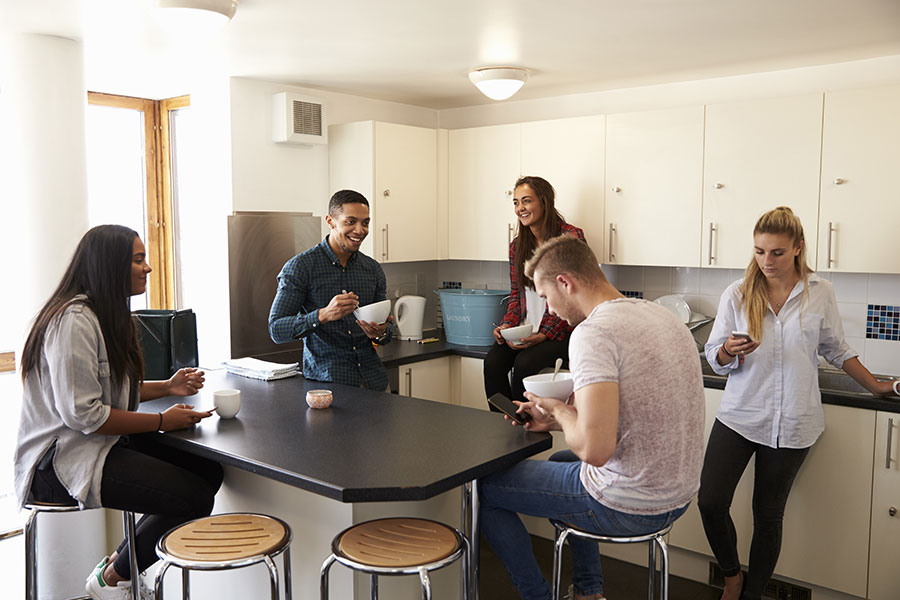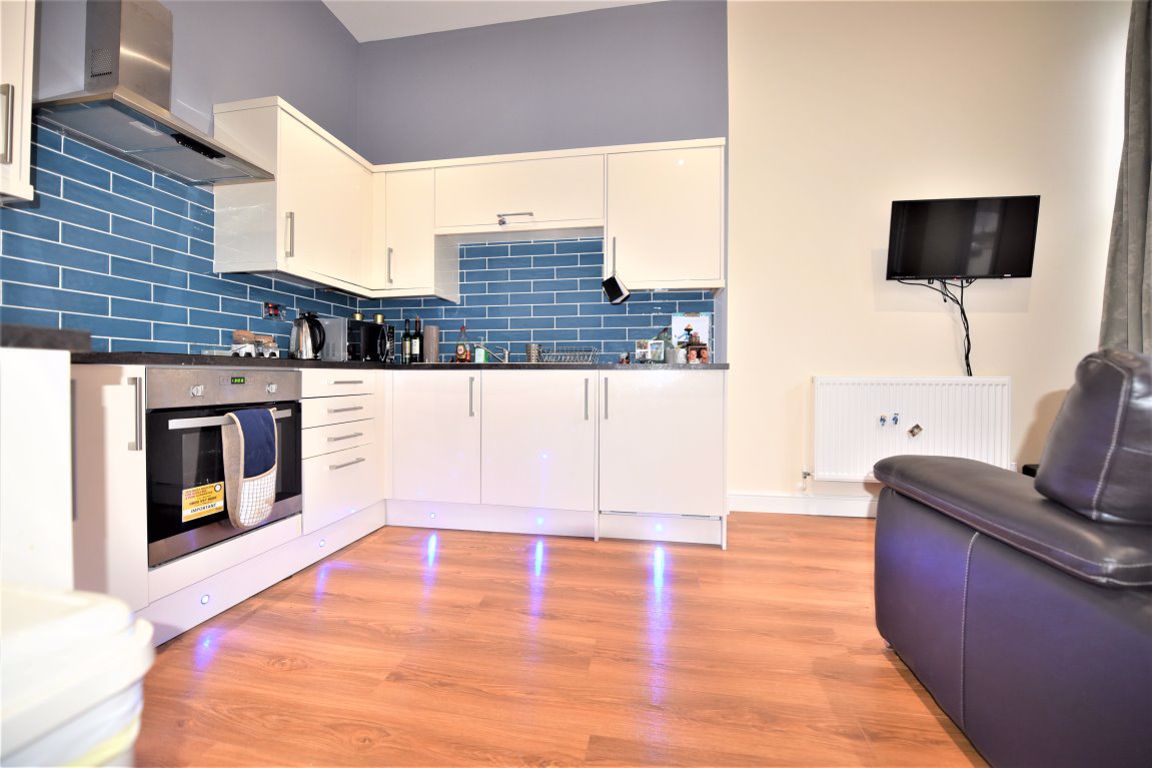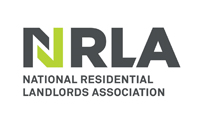Student Halls vs Private Accommodation at Leeds Universities
24th March 2022
For many students, living away from home for the first time is one of the biggest changes about university. But how do you make the right decision about where you’re going to live? We’ll take you through the options, discuss pros and cons of different choices, and leave you ready for the next step.
First of all, let’s think about halls.
What are halls, exactly?
‘Halls’ is a shortened name for university halls of residence. These provide accommodation for students either on or near campus, and can be a useful halfway house between living at home and renting a place independently.
They’re usually arranged with a number of rooms grouped into flats or corridors, with four or more sharing a communal kitchen. Many have en-suites, though some have shared bathrooms. There may also be a communal living space. Each room has its own lockable door, and there will be a lockable door at the entrance. Your rent usually includes bills - water, gas and electricity - and wifi
The number and type of halls that a university has available varies from campus to campus. Leeds University has a wide range of established halls, some modern and purpose-built, others set in older, character-ful properties. Leeds Beckett, as a newer university, offers halls run in partnership with private companies or has blocks allocated to Beckett students in units run outright by private companies.

Does living on campus mean I’ll be close to uni?
This is a good question when you’re making your decision which halls to apply for. Some halls are right on campus, which means you can roll out of bed and into a lecture. The halls at Leeds Trinity, being out of the city centre in Horsforth, are all on campus, though there are still a variety of types and levels of accommodation to choose from. Leeds Uni has some halls on campus, and others out near Headingley: if you like to have a space between work and home, this could be a real bonus.
Will I automatically get a place in a hall?
Once you accept a place at university, you’ll be able to apply for a room in halls. Most universities will guarantee the option of halls accommodation for your first year; if you’ve come through clearing, you’re still likely to be offered a room, though there will be less choice and you may not hear where you’ll be living until close to the start of term.
It’s a good idea to try and visit university accommodation when you go for a look around the university, and ask current students what their advice would be when making the decision of where to apply for. Bear in mind that some halls fill up very quickly and you might not get your first choice.
How does paying for halls work?
Once you accept a place in halls, you’ll be sent a contract to sign. It’s worth reading this carefully to check what you’re getting for your payments and see any restrictions in terms of what you can use in your room - some places, for example, won’t let you put up fairy lights or use certain appliances. There will be a deposit to pay, around £200, and you’ll almost certainly need a guarantor. This is someone, usually a parent, who also signs the contract and guarantees to pay any outstanding rent. The rent itself will normally be paid at the start of each term. The contract will also stipulate how many weeks you’ll be renting for. This can be up to 52 weeks but will more commonly run from the start of the first term to the end of the summer term. By signing the contract, you’re agreeing to pay for the length of the contract, and you won’t be able to get out of it halfway through the year.
I read something about private halls - what’s the difference?
Traditionally, halls were run by the university for their own students. Nowadays, an increasing number are privately-operated, especially in larger cities. A private hall of residence is likely to be open to students from a number of universities. In Leeds, for example, you may find students from Leeds University, Leeds Beckett, Leeds Trinity and Leeds Arts, all under the same roof. Privately-run halls tend to have better facilities, some even including cinema rooms, gyms and games areas. They do, however, tend to cost more.
What’s provided in the room?
You can expect a bed, of course. This might be a small double, though many still have single beds. There will be a desk,a chair and a wardrobe, and often a pin board so that you can personalise your space without making holes in the walls. In most halls, the furniture is fixed in place, though older buildings which have been adapted into accommodation may have fittings that you can move around. Lyddon Hall, one of the University of Leeds’ halls, is made up of a main hall and a number of Victorian houses, and the furniture there is unfixed.
You’ll need to bring bedding with you, including your own quilt and pillows, and your own towels. It’ll be your responsibility to wash, dry and change your bed. Most halls have a laundrette on site. It’s also down to you to keep your space clean and tidy, though communal areas will often have some cleaning done for you.

What will the kitchen be like, and do I have to make my own food?
The kitchen will have the basics: fridge, cooker, kettle and perhaps a microwave. There will be a table, and enough cupboards for everyone to keep their food and utensils together. You’ll need to provide your own plates and cutlery, and also equipment such as a saucepan and frying pan. Often, you’ll have the chance to contact your flatmates before term starts and organise extras. One person might bring a toaster, for example, and someone else might have a coffee machine, and these can be shared amongst the group. If it’s really important to you that no-one uses your stuff, it’s best to communicate that right from the start, and make sure you always put things away. Communal living does require some give or take, however, so perhaps plan to take old things that you won’t mind becoming part of the general pool.
Halls can be catered, self-catered or a mixture of the two. A catered hall will include the cost of meals within the overall price, though where and how you get the food will vary. Leeds Uni’s Devonshire Hall, for example, has a dining room which provides breakfast and dinner from Monday to Saturday and lunch on Sunday. Other halls provide an allowance every day which you can spend at food outlets on campus, choosing exactly what and when you eat.
Pros of living in halls
-
You’re all in the same boat, living away from home for the first time and getting used to uni.
-
Sharing a halls flat can be a great way of making friends outside of your course
-
Accomodation is usually of a good standard, and any problems will be dealt with efficiently
-
You don’t have to worry about bills
-
You’ll be close to uni, and security is good
Cons of living in halls
-
You’re living with a lot of people, with all the noise that entails
-
You don’t get to choose who you’ll be sharing a flat with
-
The cost of halls is often quite pricey
-
Not much individual choice: for example, you might not be able to turn the heating up or down, or put things on your walls

Private rentals
This means renting a house from a private landlord and, whilst your university may be able to give advice, it won’t have anything to do with the rental process.
Any town or city with a large student population will have loads of landlords with properties specifically geared towards student rentals. Leeds is no different, and areas such as Headingley, Burley and Hyde Park are known for their high student population. Student properties tend to have a large number of bedrooms, from three or four up to ten, with a shared kitchen and bathroom/s and often a living room. They’re known officially as Houses of Multiple Occupancy (HMOs), and have certain safety standards which the landlord must keep up-to-date. Students group together to become joint tenants, each paying their own rent but taking responsibility to split the bills between everyone.
Is it a good idea to rent privately in your first year?
This depends on many factors - how well you know the area you’ll be living in, whether you know people who might want to share a house, or if you’ve missed out on university accommodation. For many reasons, it’s common for students to leave renting a house outside of uni until their second year, when they’ve got a group of friends to go into a house with and they know the area a bit better. If you’re an older student - for example, you’ve had a year or two out or done a foundation year in advance of your degree - or just prefer living by yourself, you could look for a studio. These are small flats with a single bedroom, a bathroom, and your own kitchen facilities.
You can go straight into renting a room from the get-go: there will always be groups of students advertising for another housemate, so ask if the uni has a list. Otherwise, check in with student forums online or Facebook groups, where you’ll almost certainly find other students in the same boat who’d be up for a house-share. Unipol, a charity operating in Leeds, Nottingham and Bradford, has an online notice board specifically focussed on putting students in search of a house share in touch with each other. Whichever route you take, make sure you have conversations before committing to check you’ll all be a good fit.
How do I find a place to rent?
Talk to students who have experience of renting in the area, either in person or on student forums. There’s nothing like word-of-mouth recommendations or warnings of what to look out for! You can go through regular letting agencies, who will be used to offering homes to students. They manage houses for landlords, organising tenancy agreements, sorting out problems and collecting rent. You can also rent directly from a landlord, which might save money on agency fees but also means you won’t have a buffer if there are any issues with the house. There are also dedicated sites for matching students to private rental accommodation. Unipol, which operates in Leeds, Nottingham and Bradford, has an online process for finding somewhere to live, and runs an accreditation system for landlords so that you can be sure of certain standards.
If you want our recommendation, not that it's biased, but you should check out all the properties that we, at DEU Estates, have to offer. We've been doing this for over 50 years and we have a vast amount of knowledge and experience in finding students of Leeds univeristies their perfect accommodation. Come and do a search on our site.
How often will I have to pay rent?
Rent is usually paid monthly, although you can find landlords who will accept termly payments. Make sure that you budget, ring-fencing your rental money when your student loan comes in. Your contract might run for nine months, or it might go on over the summer - think about whether you’ll want to stay or if you’re planning to go home at the end of the year. If you don’t want to stay over the holidays but do want to keep the house for another year, it might be possible to pay a retainer (a smaller amount of money) to keep hold of your room. One thing to note: once you’ve signed your contract, you’re liable for the whole term of the contract, even if you decide you want to move out.
At the start of your tenancy, you’ll have to pay a deposit and a month’s rent in advance. You’ll also need a guarantor, who’s someone who will guarantee to cover any unpaid rent. A joint tenancy agreement - where a group take on a property together - might mean that your guarantor would be expected to pay any shortfall in rent, not just yours. Check the agreement, and see if your student union will offer advice if you’re in doubt about this.
Are bills included?
Some private student rentals include bills in with the rent, which is a handy way of knowing where you are with your money. Many will leave you to sort them out amongst yourselves, though. You’ll need to include gas, electric and water, all of which will come in as separate monthly bills. This can be one of the hardest parts of sharing, so have a conversation right at the start about how it’s going to work. There are companies which split the bills for you, but you’ll pay a premium for the service, and there are ways of making the process straightforward.
You could all agree to pay a certain amount at the start as a kitty. A recent survey suggested that average costs are £40 a month, so you could use this figure as a starting point, on the understanding that everyone will be ready to make up any difference when the bills come in. There are also free bill-splitting apps to organise payments within a group. You could even open a joint bank account, but this is best reserved for a group you know well and trust. The utility provider will need you to get in touch at the start of your tenancy so that the bill can be changed to your name. You could decide to split these between all the housemates, with one or two of you taking each one, or you could see if all of your names can go on all of the bills. Again, be cautious with this as it means being linked to these people on future credit checks: if they’re in the habit of defaulting, this could affect your personal rating.
You’ll almost certainly want broadband, and this will be for you to arrange. Shop around for the best deal. Some companies offer a nine month option specifically for students, so that you’re not having to pay when you move out in the summer. These might actually be more expensive than a standard 12 months, though. Another option is to get mobile broadband, or use your phone as a hotspot.
Will there be furniture?
Student houses tend to come with the basics: a bed, desk, wardrobe, curtains. The kitchen will have a cooker and fridge, and may also include a washing machine, microwave or even a dishwasher. There might be plates, cutlery and cooking equipment as well, but do check in advance. The living space will have a sofa and armchairs, and perhaps a television. When you move in, the letting agents or the landlord will give you an inventory, and may go round the house with you to check on what’s there. This is so that, at the end of your tenancy, they can check if anything’s missing or broken. It’s worth you taking photographs when you move in, so that you have evidence of any damage that’s already there. You don’t want to end up paying out of your deposit for things that weren’t your fault, and having evidence is the best way to avoid this happening.

Pros of private renting
-
You get to choose who you live with
-
The cost of living can be much less
-
You’ll be able to stay over the holidays
-
You have more choice about the area you live in
-
It feels more like home
Cons of private renting
-
It’s up to you to keep on top of the bills
-
You might end up living at a distance from uni
-
Student houses often aren’t that fancy (on the other hand, this might mean not having to worry about how things look!)
-
It can be tricky dealing with dynamics within the house
Tips for a trouble-free experience
Whether you go for university accommodation or choose the private rental route, living with other people will bring challenges, but also a lot of fun.
-
Search uni forums and student websites for honest reviews of different accommodation options. You can ask what it’s like to live somewhere and get a view from the ground. Bear in mind that people do see things in a certain light, however, so don’t rely on one opinion.
-
Forums are also good places to get advice if things aren’t going so smoothly. Whatever’s happening in your house or flat, you can be sure it’s happened before! Ask the question and see what solutions others have found helpful.
-
However much you try, you’re always going to find that someone hasn’t washed up, or that your milk keeps disappearing. It’s a good plan to start out with ground rules that everyone agrees to, but be as flexible as you can. A marker pen to label your stuff, or allocating a shelf in the fridge is a good start, and maybe you could have a kitty for basics and take turns in stocking up.
-
Passive aggressive whispering about things that are driving you mad will rarely make things any better. Also, bear in mind that you might be doing things that are annoying as well! On the other hand, you shouldn’t have to put up with inappropriate behaviour: find a good time to sit down and talk through any problems before they get to a damaging stage, perhaps asking a neutral friend to sit in for balance.
-
It can be helpful to build something of a house dynamic: maybe you could have a Sunday roast together once a month, or plan themed nights once or twice a term?
-
Communal living can be hard if you like a quiet life. Think about some noise-cancelling headphones or use ambient noise apps to give yourself a bit of peace.
There will be ups and downs, but uni is a great time to try out new things and make friends for life. Go in with an open mind and enjoy the experience!










